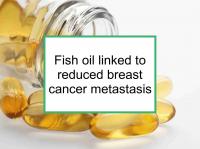Fish oil contains two major marine omega-3 fatty acids, docosahexaenoic acid (DHA) and eicosapentaenoic acid (EPA), that have been reported to have chemopreventive effects in breast cancer cells and animal models of breast cancer. Fish oil has been found to prevent DNA damage and significantly reduce proliferation in precancerous tissues.
Fish oil has also been found to inhibit early stages of mammary tumor development in a mouse models of HER-2/neu overexpressing (HER2+), triple negative (ER-/PR-/HER2-), and hormone receptor positive (ER+/PR+) breast cancer.
Fatty fish consumption has been shown to be associated with reduced risk of breast cancer and improved survival in women. Fish oil reduced bone metastasis in a mouse model of triple negative breast cancer in one study. Now a new study has elucidated the mechanism of action by which DHA inhibits ER+/PR+ breast cancer cell growth in breast cancer cells and a mouse model of breast cancer.
Latest research finds fish oil reduces metastasis
The study referenced at the beginning of this news story was designed to investigate the relationship between the marine omega-3 fatty acid DHA and β-catenin, one of the key components of the Wnt signaling pathway. The Wnt signaling pathway sends β-catenin into the cell nucleus to activate the epithelial-to-mesenchymal cell transitions that cancer cells undergo in the process of becoming capable of metastasis. Inhibition of β-catenin signaling appears to play a central role in the anticancer activity of certain micronutrients.
In the first part of the study, 4T1 mouse mammary cancer cells and ER+/PR+ MCF-7 human breast cells were exposed to DHA. The 4T1 line is a highly aggressive tumor cell line that can spontaneously metastasize from the primary mammary gland tumor to distant sites. DHA was found to inhibit cell growth strongly, inducing G1 cell cycle arrest in cell lines. DHA was found to reduce the expression of β-catenin, cyclinD1 and other genes involved in cancer growth and progression.
In the second part of the study, mice bearing 4T1 mammary tumors were divided into groups that were fed a either standard diet or a 5% fish oil-supplemented diet for 30 days. The fish oil diet was found to significantly reduce tumor growth by inhibiting cancer cell proliferation and inducing apoptosis (programmed cell death). The fish oil diet was shown to induce down-regulation of β-catenin in tumor tissues. The mice on the fish oil-supplemented diet also had decreased lung metastases. The authors conclude the findings suggest that DHA produces its anticancer effects through downregulation of Wnt/β-catenin signaling.
Please see our article on recommended fatty fish for more information on sources of marine omega-3 fats.
